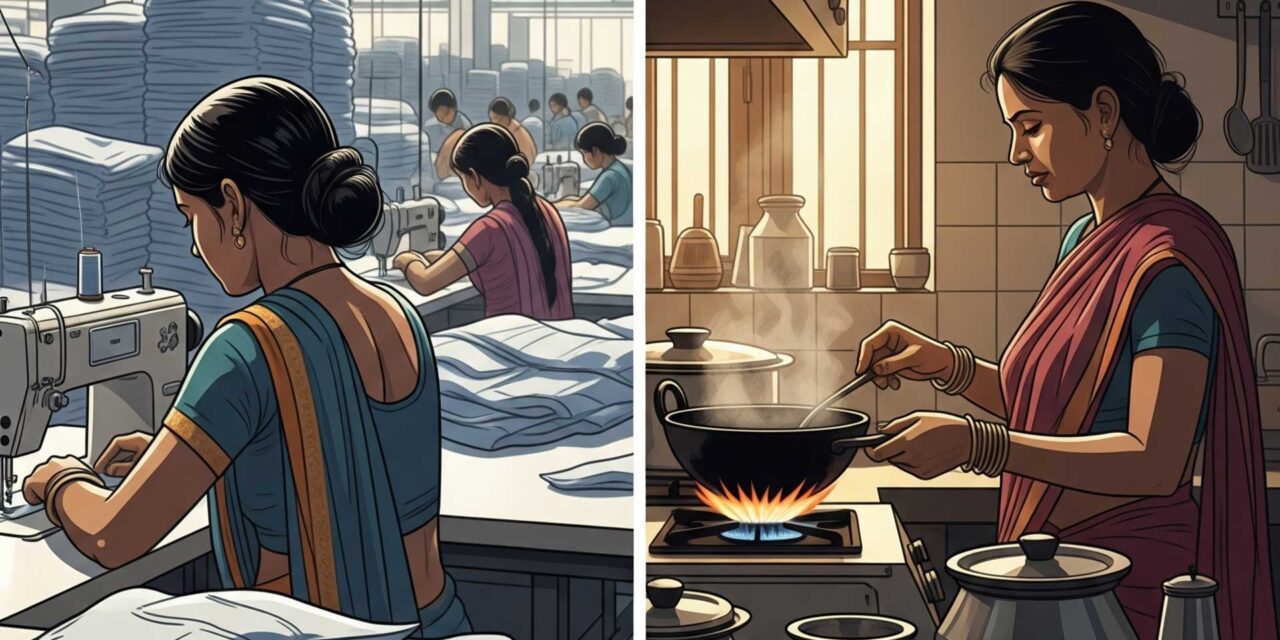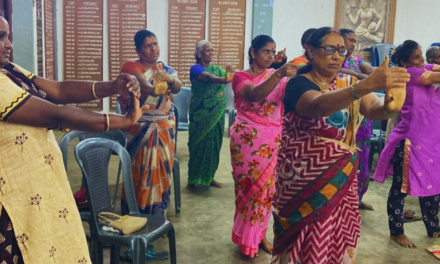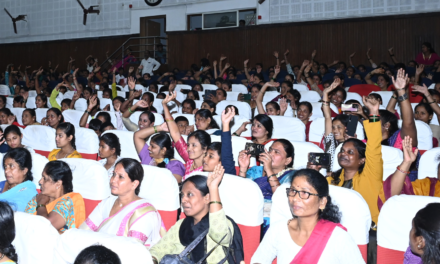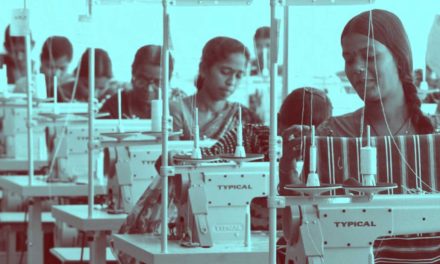With Factory Shifts Extended, Women Garment Workers Say Even Small Rituals of Rest Have Vanished From Their Day
Lakshmi’s first work shift begins much before her factory bell rings at 8:30am. She wakes up at dawn, makes breakfast, packs food for herself and her two sons, helps them get ready for school. The factory she works at recently increased job duration from 8.5 to 9.5 hours, excluding a short break. She now returns home by 7 pm, just in time to start her next shift: cooking dinner and caring for her children. A 36-year old single mother, the responsibility of running the household is solely on Lakshmi (*name changed).
“Since the work hours got extended, I don’t even get time for a cup of coffee,” she says. That simple ritual – a steaming cup of coffee before beginning housework – used to offer a moment of calm. An extra hour of work may not seem like much, but for women like Lakshmi, it’s a meal skipped, a child’s story left untold, and rest denied.
Double Shift: At the Factory and at Home
Gowri (name changed), aged 46, another worker at the same Bangalore-based factory, says there is no time to even think about rest. A tailor at the factory, she is also a caregiver at home, tending to her husband who is recovering from a stroke. Most of her time at home goes into preparing meals according to the doctor-prescribed diet.
Ever since her factory mandated a nine-hour shift, exhaustion has been constant. By the time she finishes everything, it is nearly 10 pm, and she falls asleep as soon as she lies down. “It has been weeks since I caught an episode of Annayya (TV serial),” she laughs without mirth. “It was the only time I would relax without doing any work.”
Disconnected from their hometowns and support networks, many women navigate this double burden alone. Gowri’s daughter drops by when she can, but she has a household of her own to manage. Lakshmi, on the other hand, has nobody to turn to, since most of her family lives in her hometown Kolar.
The Cividep India report, The World of Home and Work, calls this a crisis of social reproduction: women are expected to maintain the productive economy by performing unpaid reproductive labour at home, with little support from the state or household. The report finds that women garment workers, on average, spend three hours in the morning and another three in the evening on unpaid care work – cooking, cleaning, and caregiving.
Illusion of a Break
Lakshmi points out that the management now gives workers Saturdays off, pitched as compensation for longer weekday hours. But does that really offer rest? In practice, Saturdays have become a day for catching up: paying bills, buying provisions, finishing the cleaning that was skipped through the week. “I try to rest on Sundays,” says
Lakshmi, “but my mother-in-law often needs me. She lives alone, and I’m expected to help her with groceries and cleaning.”
She and Gowri debate whether the extra day off really balances out the longer days.
“I can wake up a little late!”
“It allows me to rest my legs, which sometimes hurt if I work for too long.”
“But I end up spending all of Saturday cleaning and running errands, it’s not a holiday!”
“It’s an extra day of work, not at the factory but at home!”
The Future Is No Safer
Ever since Lakshmi lost her husband, all the decisions in the family are made by her mother-in-law, who has been asking her to quit since the work hours were extended. “She asks me who will take care of the house and the children if I am away all day,” she relays, “She’s not wrong. But if I leave, what will I do to earn a living?”
Cividep’s report finds that 91% of garment workers remain in the sector due to lack of alternative skills or information. Lakshmi is part of this majority. She left school early and doesn’t believe she qualifies for other work. “Piecework is an option,” she says. “I did some when I was younger. I hated it. But if I have no choice, I may go back.”
Piecework in the informal sector means being paid by output, with no fixed hours, no job security, and often lower wages. It removes even the thin protections of factory work — no provident fund, no medical benefits, no fixed pay. “At least in the factory, I get my salary on time, and I can access ESI,” says Vani. “Outside, there’s nothing. No safety. No rights.”
NO TIME TO SPARE SERIES
Karnataka’s proposal to extend the workday to 10 hours under the Shops and Commercial Establishments Act has sparked debate, largely focused on IT and ITeS employees. But for garment workers, especially women, the reality of longer hours began quietly after the 2023 amendment to the Factories Act, which increased shift lengths and enabled night work. Now, with changes likely to affect smaller, often informal garment units as well, the risk of overwork and exploitation deepens. ‘No Time To Spare’ is a series of ground reports that draws from Cividep’s ongoing fieldwork and research, including our recent report and documentary, to bring worker well-being into focus. Each piece captures one voice, one story, from the margins of Karnataka’s garment industry.





